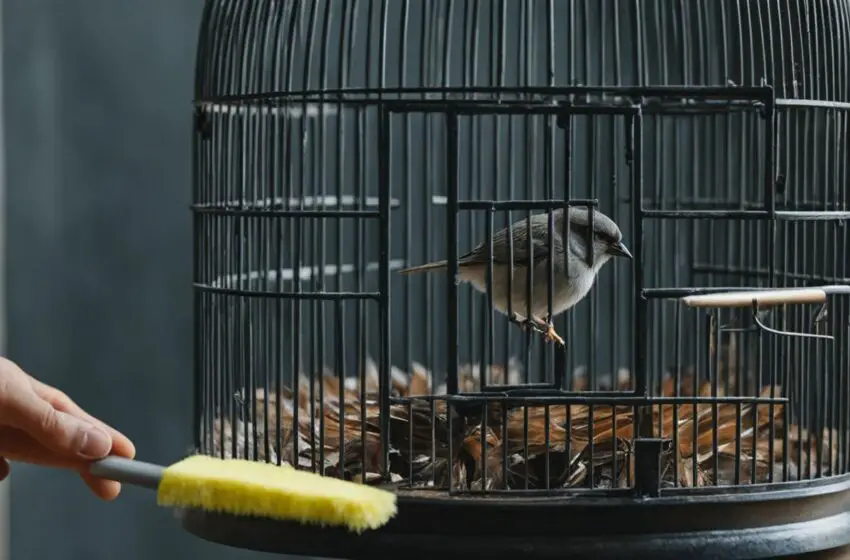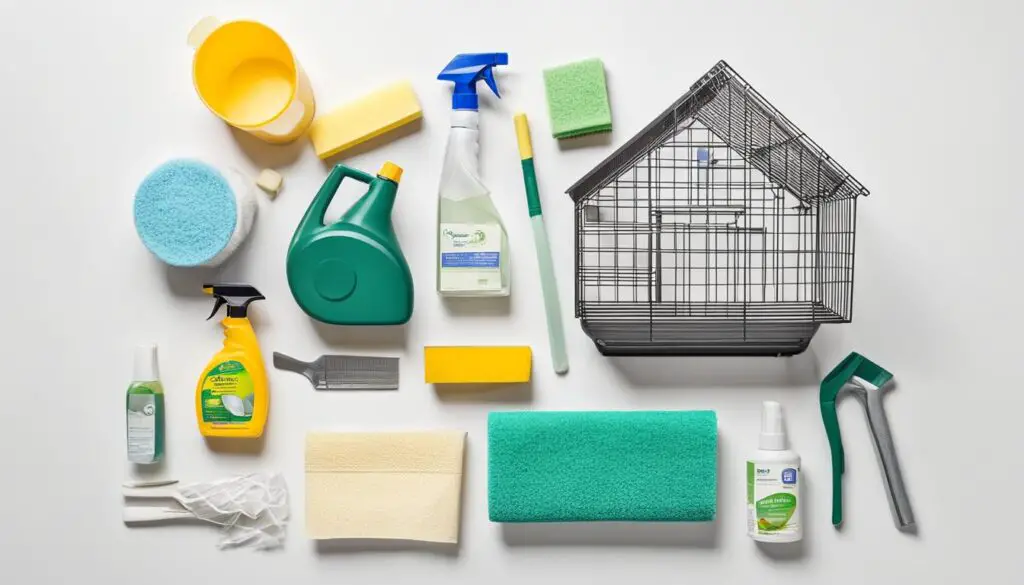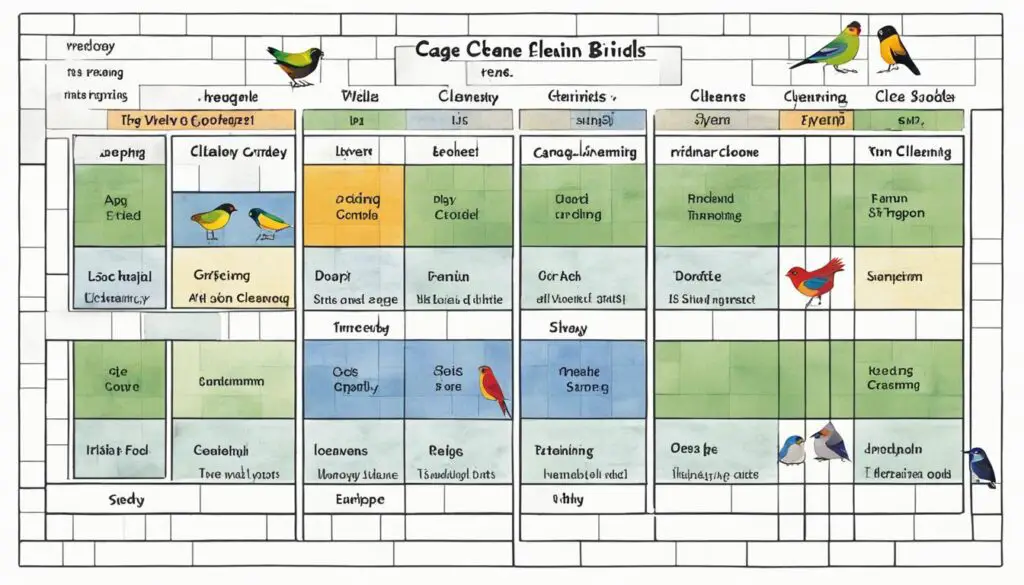How to Clean Your Small Bird’s Cage Efficiently

Cleaning your small bird’s cage is an essential part of maintaining their health and happiness. With a proper and efficient routine, you can ensure a clean and safe habitat for your feathered friend. In this article, I will guide you through the steps to clean your small bird’s cage effectively.
Importance of Regular Cage Cleaning
Regular cage cleaning is crucial for maintaining the hygiene of your small bird’s living space. A clean cage is not only visually appealing but also plays a vital role in ensuring your bird’s overall health and well-being.
Cage hygiene: A clean cage prevents the growth of harmful bacteria, mold, and parasites that can pose serious risks to your bird’s health. By regularly cleaning the cage, you create a safe environment that minimizes the chances of infections and illnesses.
Bird health: A dirty cage can contribute to respiratory issues, skin irritations, and other health problems for your feathered friend. Regular cleaning helps eliminate dust, dander, and other airborne particles that can irritate your bird’s respiratory system and cause discomfort.
Cleanliness: Clean surroundings are essential for the well-being of both you and your bird. Regular cage cleaning controls unpleasant odors that can accumulate over time, providing a more pleasant environment for you and your bird to enjoy.
“A clean cage leads to a healthier and happier bird.”
By prioritizing regular cage cleaning, you can create a clean and hygienic habitat that promotes your bird’s health and happiness.
| Benefits of Regular Cage Cleaning | |
|---|---|
| Prevents the growth of harmful bacteria, mold, and parasites | Creates a safe and healthy living environment for your bird |
| Minimizes the risk of infections and illnesses | Promotes respiratory health by eliminating airborne particles |
| Controls unpleasant odors | Maintains a pleasant living space for both you and your bird |
Supplies Needed for Cage Cleaning
Before you start cleaning your small bird’s cage, gather all the necessary supplies. Having these essentials handy will facilitate an efficient cleaning process:
- Cleaning Supplies: A mild bird-safe cleaner, such as diluted white vinegar, is ideal for maintaining a sanitary bird cage.
- Scrubs and Sponges: Use a scrub brush or sponge to effectively remove dirt and grime from the cage surfaces.
- Fresh Bedding Material: Ensure you have clean bedding material available to replace the old one after cleaning. This will provide a comfortable and hygienic environment for your bird.
- Cage Grating or Liner: If your bird’s cage has a grating or liner at the bottom, make sure it is in good condition and ready for cleaning.
- Towels or Paper Towels: Have towels or paper towels on hand to dry the cage after cleaning. Drying thoroughly is important to prevent mold or mildew growth.
By gathering these supplies before you begin, you’ll be well-prepared for an effective cage cleaning routine.

| Supplies | Description |
|---|---|
| Cleaning Supplies | A mild bird-safe cleaner, such as diluted white vinegar, for sanitizing the cage. |
| Scrubs and Sponges | Tools for scrubbing and removing dirt and grime from the cage surfaces. |
| Fresh Bedding Material | Clean material to replace the old bedding, providing comfort and hygiene. |
| Cage Grating or Liner | A grating or liner at the bottom of the cage for easy cleanup. |
| Towels or Paper Towels | For drying the cage after cleaning to prevent moisture buildup. |
Step-by-Step Guide to Cleaning the Cage
Follow these step-by-step instructions to clean your small bird’s cage efficiently:
- Remove your bird from the cage and place them in a safe and secure area.
- Take apart any removable parts of the cage, such as perches, dishes, and toys.
- Dispose of the old bedding material and clean the grate or liner at the bottom of the cage.
- Use the mild bird-safe cleaner and scrub brush or sponge to clean all surfaces of the cage, including the bars, perches, and dishes.
- Rinse all the cleaned surfaces thoroughly with water to remove any residue from the cleaner.
- Allow the cage to air dry or use towels or paper towels to dry it completely.
- Replace the bedding material with fresh and clean material.
- Put the cage back together and return your bird to their clean and fresh habitat.
Frequency of Cage Cleaning
The cleanliness of your small bird’s cage plays a significant role in their overall well-being. Establishing a cleaning schedule that suits the size of your bird, the number of birds in the cage, and the cleanliness of the cage itself is essential to maintaining a healthy habitat.
As a general guideline, it is recommended to clean the cage at least once a week. This frequency allows you to remove any accumulated waste, debris, or potential sources of odors. However, it’s important to be aware that certain situations may require more frequent cleaning.
If you notice excessive mess or detect unpleasant odors, it is a sign that your bird’s cage may need more frequent cleaning. Birds have diverse eating and defecation habits, and environmental factors can also affect the cleanliness of the cage.
Regularly checking the cage for any signs of dirt or debris will help you determine if it’s time for a more thorough cleaning. Adjusting your cleaning schedule accordingly will ensure that your bird’s cage remains clean and pleasant for them to live in.
To summarize:
- Clean the cage at least once a week as a general guideline.
- Adjust the cleaning frequency based on the size of your bird, the number of birds in the cage, and the overall cleanliness of the cage.
- Pay attention to excessive mess or odor, as they may indicate the need for more frequent cleaning.
- Regularly check the cage for any signs of dirt or debris to determine the appropriate cleaning schedule.
By adhering to a proper cleaning schedule, you can create a clean and healthy environment that promotes the well-being of your small bird.
Image: Cage Cleaning

Maintaining Cage Hygiene Between Cleanings
While regular cage cleaning is important, it’s also essential to maintain cage hygiene between cleanings. Performing daily spot cleaning can help keep the cage tidy and prevent the buildup of waste. Remove any droppings, uneaten food, or debris on a daily basis to maintain a clean environment for your bird. Wiping down surfaces with a damp cloth, if necessary, can further contribute to the cleanliness of the cage. These small daily maintenance tasks will help ensure that your bird’s cage remains fresh and hygienic between thorough cleanings.
Maintaining Cage Hygiene Between Cleanings
In addition to regular cage cleaning, maintaining cage hygiene between cleanings is essential. Daily spot cleaning can help keep the cage tidy and prevent the buildup of waste. Remove any droppings, uneaten food, or debris on a daily basis. Wipe down surfaces with a damp cloth if necessary. This routine maintenance will contribute to a cleaner and healthier environment for your small bird.
| Benefits of Daily Spot Cleaning: | Steps for Daily Spot Cleaning: |
|---|---|
|
|
By incorporating daily spot cleaning into your cage maintenance routine, you can ensure that your small bird’s living space remains fresh and hygienic. This simple practice will not only promote your bird’s well-being but also make it easier to perform thorough cleanings less frequently.
Conclusion
A clean cage is crucial for the health and well-being of your small bird. By following an efficient routine of regular cleaning and maintaining cleanliness between cleanings, you can ensure a safe and comfortable habitat for your feathered friend.
Remember to use mild bird-safe cleaners, gather all the necessary supplies, and adjust your cleaning schedule based on your bird’s needs. With proper cage cleaning, you can provide a happy and healthy living environment for your small bird.
FAQ
How often should I clean my small bird’s cage?
It is recommended to clean the cage at least once a week. However, if you notice excessive mess or odor, it may be necessary to clean more frequently. Regularly check the cage for any signs of dirt or debris and adjust your cleaning schedule accordingly.
What supplies do I need for cleaning my small bird’s cage?
You will need a mild bird-safe cleaner, such as diluted white vinegar, a scrub brush or sponge, fresh bedding material, a grating or liner for the cage bottom, and towels or paper towels for drying.
How do I clean my small bird’s cage?
Follow these steps to clean your small bird’s cage efficiently:
– Remove your bird from the cage and place them in a safe and secure area.
– Take apart any removable parts of the cage, such as perches, dishes, and toys.
– Dispose of the old bedding material and clean the grate or liner at the bottom of the cage.
– Use the mild bird-safe cleaner and scrub brush or sponge to clean all surfaces of the cage, including the bars, perches, and dishes.
– Rinse all the cleaned surfaces thoroughly with water to remove any residue from the cleaner.
– Allow the cage to air dry or use towels or paper towels to dry it completely.
– Replace the bedding material with fresh and clean material.
– Put the cage back together and return your bird to their clean and fresh habitat.
How do I maintain cage hygiene between cleanings?
Daily spot cleaning can help keep the cage tidy and prevent the buildup of waste. Remove any droppings, uneaten food, or debris on a daily basis. Wipe down surfaces with a damp cloth if necessary to maintain cleanliness between full cleanings.
Why is regular cage cleaning important?
Regular cage cleaning is important for maintaining the hygiene of your small bird’s living space. It prevents the growth of harmful bacteria, mold, and parasites that can negatively impact your bird’s health. It also helps control unpleasant odors and provides a more pleasant environment for both you and your bird.
How can I ensure a clean and safe habitat for my small bird?
By following an efficient routine of regular cage cleaning and maintaining cleanliness between cleanings, you can ensure a clean and safe habitat for your small bird. Use mild bird-safe cleaners, gather all necessary supplies, and adjust your cleaning schedule based on your bird’s needs.



